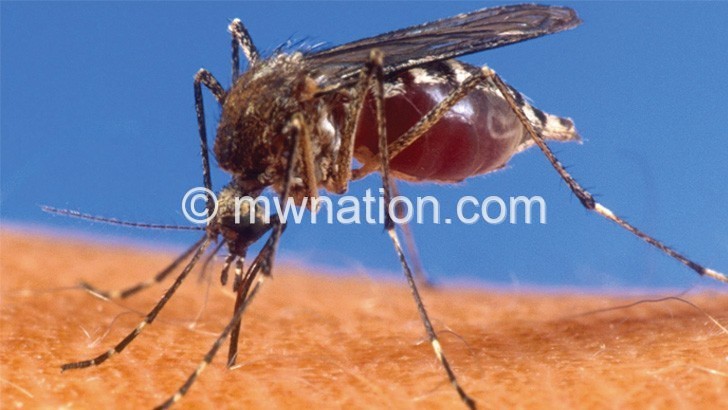Agonies of a city of mosquitoes
Forget the days Blantyre prided itself as one of the cleanest cities in the world. Now it is a city not unlike any other—filthy, with wanton dumping of solid and liquid waste in rivers literally reaching stinking levels.
To Marcelina Gwejula, 46, this is a city of mosquitoes. The mother of three, who lives in the populous Chilomoni Township, no longer spends her evenings and nights in the open because an infestation of mosquitoes means more bites before she goes to sleep under a treated net that was supposed to safeguard her from malaria attacks.
She laments enduring “swarms of mosquitoes”, saying: “Every morning, I gather my children to assess the gravity of mosquito bites. Malaria is hitting us hard.”
This year, she has been to Chilomoni Health Centre and Queen Elizabeth Central Hospital five times. In all instances, her children were diagnosed with malaria, the major killer of children and pregnant women.

Her husband suffered the killer disease in June. She is already panicking, fearing she may be next on the sickbed as the city wages a losing battle against malaria.
“We have treated mosquito nets in all our rooms. Our yard has no swamps, but mosquitoes bite ceaselessly,” she laments.
Malaria is the most frequent cause of sickness and death in children under five years old, killing up to 40 in 100 babies aged below two. According to the Ministry of Health, under-fives on average suffer 9.7 malaria episodes a year, while adults suffer six.
The human and economic costs are enormous. Besides the costs of consultation, treatment, hospitalisation and travel, malaria often leads to low productivity and lost income from days of work missed. The cost of malaria to the average household is estimated at K2 625 (almost US$35) annually.
At Chilomoni, health workers say mosquito stings occur before bedtime. This is why Gwejula reportedly ensure that her children go to bed by 6pm and tuck themselves in nets as they wait for dinner.
“We are on alert. We will not wait until one of us experiences malaria signs,” she says.
Her desperation mirrors the plight of thousands of Blantyre residents. For months, the city dwellers have been whining about frequent mosquito bites.
Blantyre City Council (BCC) confirms “a worrisome increase in the number of mosquitoes”, but health authorities have not declared a malaria outbreak yet.
City authorities blame the situation on rapid urbanisation which has led to pollution of waterways and unplanned settlements. They are worried about pollution of streams due to wanton disposal of both household and industrial waste as well as broken sewer pipes.
This breakdown in sanitation and hygiene creates breeding grounds for mosquitoes.
The foul-smelling face of crap towns is vivid in Ndirande, Chirimba, Zingwangwa, Mbayani, Mchinjiri and other townships where clogged rivers and overflowing waste skips are a common sight. Residents could not remember when the giant bins were last emptied.
Ndirande-based trader Chitsanzo Lupiya says it takes weeks for the council to empty the spilling communal bin.
To Chirimba resident John Gondwe, the rot points to more mosquito bites and malaria attacks.
“Government is spending a lot of money distributing treated mosquito nets, but we are being exposed to malaria before we get into the nets,” he says.
Malaria remains the number one cause of admissions in the country’s overwhelmed health facilities, accounting for up to 500 000 patients every month. Monthly, around 800 000 anti-malaria doses are distributed.
Government has distributed over six million nets for the past five years, increasing the number of homes served from 13 percent in 2000 to 55 in 2012. Nine million more are being distributed .
Besides the treated nets, the National Malaria Strategic Plan recommends larvaciding—the spraying of chemicals in breeding grounds to kill mosquito larvae.
The routine sprays have not been conducted for over five years.
Malaria Alert Centre senior entomologist Themba Mzilahowa, who has been championing the initiative, says the preventive measure was abandoned due to high costs.
“The problem is that most effective chemicals are expensive. This is why the initiative was suspended. If this initiative was revived, we would significantly reduce malaria transmission and save huge sums spent on malaria treatment in future,” he argues.
According to Gwejula, the lamented mosquito outbreak confirms that authorities have dosed off on duty.
The malaria strategy, which expires this month, envisions Malawi becoming malaria-free.
Last year’s malaria indicator survey shows that the prevalence rate has dropped by only 10 percent from 43 percent in 2010 to 33 in 2014.
This shows a long way to end malaria for good, a losing fight unless the country stops doing business as usual.
The lamented mosquito outbreak has jolted BCC to embark on a K12 million campaign to spray breeding grounds across the city.The initiative also include surveillance of mosquito breeding spots and breeding activity, indoor spraying and mass awareness.
However, the residents say the response is scanty, slow and heavily underestimated. n





